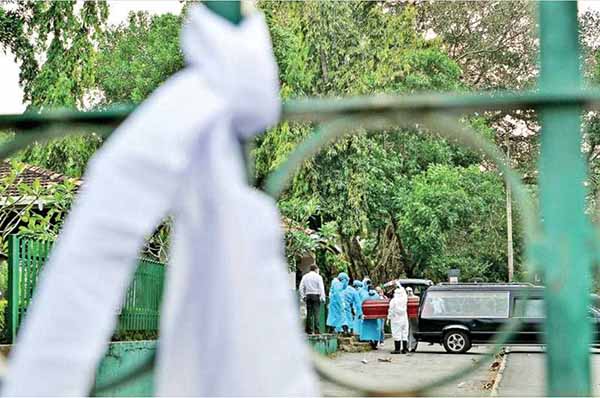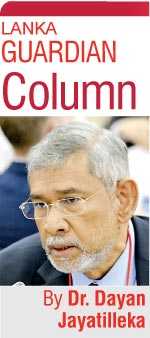The year 2020: The thrill is gone-by Dr Dayan Jayatilleka

Source:FT
On the one hand, we have the militarisation of public security, including the control of the Police force which is to be raised to 100,000 members, supplementing the ongoing (Chinese-style) “grid management” neighbourhood and village-level system of intelligence gathering. On the other hand, we have an insensitive policy about the dead bodies of Muslims; a policy that is not only heartless but also brainless, since the true story of the burning of the body of an infant can generate waves of shock, horror, and outrage, across the Muslim community not only in Sri Lanka but also in the region and throughout the world, thereby breeding radicalisation and extremism – Pic by Shehan Gunasekara
“The thrill is gone It’s gone away for good” – BB King, ‘The Thrill is Gone’
Year 2020 is one that humanity—certainly the generations alive today—shall always recall, collectively, as the most dreadful.
2020 was a watershed year for Sri Lanka. Politically, the administration of President Gotabaya Rajapaksa secured a two-thirds majority in Parliament. Constitutionally it concentrated political power by means of the 20th Amendment to a degree that, at the least, took us back over 40 years to the original J.R. Jayewardene presidency at a time when society has evolved beyond it, and by another interpretation, accumulated power at the apex to an unprecedented degree, superseding even that of the original Jayewardene model.
2020 witnessed the parliamentary extinction of the UNP, the reduction of the SLFP to a residue, and the parliamentary marginalisation of the JVP, which 15 years ago had 40 seats (and boasted of wielding the parliamentary remote-control). ‘Contact tracing’ shows that the SLFP and JVP were punished by the electorate as allies, formal and informal respectively, of Ranil’s UNP. Ranil Wickremesinghe was electorally run out of his hometown, Colombo, in 2020.
Year 2020 did not eliminate the competitive two-party system. Instead, the SLPP (‘Pohottuwa’) which spectacularly supplanted the SLFP, was joined in Parliament by the SJB, successor to the UNP. The Pohottuwa took two years to bloom, starting with the Nugegoda rally of Feb 2015, while the SJB emerged with a gestation period of months and clocked (as I observed in these pages and Upul Joseph Fernando also did in the Sinhala-language mainstream press) a higher percentage of votes and number of seats than did S.W.R.D. Bandaranaike’s SLFP at the first General Election it faced in 1952, a year after its formation.
 2020 saw the beginning of a new chapter in Lanka’s political narrative, with a Rajapaksa Raj facing a Premadasa challenger. Premadasa arrived as Opposition Leader and founder-leader of his own party, the SJB, having resisted the Rajapaksas in their Deep South fiefdom for 20 years (meeting Che Guevara’s criteria of “battles won or lost—but fought—against the enemy”) and coming through the electoral firestorm of 2019 and 2020, battling the Rajapaksas at their nationalist zenith.
2020 saw the beginning of a new chapter in Lanka’s political narrative, with a Rajapaksa Raj facing a Premadasa challenger. Premadasa arrived as Opposition Leader and founder-leader of his own party, the SJB, having resisted the Rajapaksas in their Deep South fiefdom for 20 years (meeting Che Guevara’s criteria of “battles won or lost—but fought—against the enemy”) and coming through the electoral firestorm of 2019 and 2020, battling the Rajapaksas at their nationalist zenith.
Religious apartheid?
Two phenomena strike me as emblematic of the process carrying us from 2019 through 2020 to 2021.
Firstly, the new Ministry of Public Security which has a retired Rear-Admiral as Minister, has as its Secretary, a retired Major-General, the outgoing Chief of National Intelligence, who is currently a member of the Presidential Task Force for a Virtuous Etc. Society. This symbolises the continuing, unprecedented process of the militarisation of the State; a structural change that encases the 20th Amendment and renders it something far more, and far worse, than a retrogression to the Jayewardene-era presidency.
Secondly, the cremation under the regime’s anti-COVID-19 protocols, of a 20-day old infant born to a family of the Islamic faith; protocols which have not only evoked protest from the island’s Muslim community but also has been subject to critical scrutiny by UN Special rapporteurs as well as the UN’s Resident Representative in Colombo.
President Gotabaya’s reported outreach to his Maldivian counterpart to export the bodies of the Sri Lankan COVID-19 casualties of the Islamic faith for burial, smacks of religious apartheid. If it is bad to bury the bodies in Sri Lanka why is it good to do so in the Maldives? The Sri Lankan Muslims families of corona victims are given a choice: cremation or burial in exile. And where are the Catholic victims to be buried? Kerala?
So, on the one hand, we have the militarisation of public security, including the control of the Police force which is to be raised to 100,000 members, supplementing the ongoing (Chinese-style) “grid management” neighbourhood and village-level system of intelligence gathering.
On the other hand, we have an insensitive policy about the dead bodies of Muslims; a policy that is not only heartless but also brainless, since the true story of the burning of the body of an infant can generate waves of shock, horror, and outrage, across the Muslim community not only in Sri Lanka but also in the region and throughout the world, thereby breeding radicalisation and extremism. By all available evidence, the radicalisation of Sri Lankan Muslim youth began with and as a response to the unprecedented, unchecked rise of Islamophobic movements and a campaign of violence starting with the “Dolahey karalla” campaign of 2012 and moving through the lethal violence of Aluthgama to the Ampara “infertility pills” agitational campaign.
This time, the regime’s brutal mentality as manifested in the incineration of dead bodies of COVID-19 victims including from Muslim and Christian families, has triggered civic resistance from the community, including the modern, educated, English-speaking strata and its women activists. One can only imagine what it must feel like to mosque-educated, imam-indoctrinated young men in poorer and more remote areas of the island.
Since Christchurch New Zealand impacted tragically upon Sri Lanka in 2019, one can only guess at the radicalising and mobilising effect this narrative must have on Muslims throughout the world and the negative impression that would be created in the global Islamic community, about Sinhala Buddhists or Buddhists in general.
Eastern Terminal, north-east Tamils
The Tamil prospect is no less fraught, albeit differently so. Repeating but improving an old ‘magnet-and-wedge’ move of President Jayewardene in the days of Indian Foreign Secretary Romesh Bhandari, and successfully replayed by President Mahinda Rajapaksa’s brother Basil in the aftermath of the war in 2009 (when Delhi held Colombo’s IOUs), President Gotabaya (probably counselled by High Commissioner-designate Milinda Moragoda and his Pathfinders) seems to be using the magnet of geo-economic gain to attempt a recalibration of India’s geostrategic calculus regarding his regime and the relative priority of Tamil autonomy on the island.
Colombo supplements its geo-economic magnet with an ideological ‘regime affinity’ pitch, to pre-empt or deflect an Indo-US pincer, drive a wedge between Delhi and the Tamils, play the Indian card in Geneva in March 2021, and overrun the constitutional defences of the Tamils’ ‘areas of historic habitation’.
The apparent Eastern Terminal/north-eastern Tamil trade-off may prove in retrospect a successful manipulation by Colombo, China’s partner in the Indian Ocean, of India’s “soft state” (Gunnar Myrdal), enabling the rollback or outflanking of the gains of the Indo-Lanka Accord of 1987—India’s buffer on the island’s North-East which includes Trincomalee—in exchange for a logistical toehold, dwarfed by China’s Port City footprint, on Colombo’s sea-front.
Prime Minister Mahinda Rajapaksa, a cannily pragmatic politician, is attempting to fast-track the Provincial Council elections under the existing laws and regulations, but the pro-GR ultranationalists wish to downsize the 13th Amendment either through a new Constitution or constitutional amendment before the PC elections.
President Gotabaya should settle for the implementation of the 13th Amendment under Indian auspices rather than face the Biden-Harris administration on autonomy and accountability, given that Senator Biden’s plan for Iraq, a three-component federation with a weak central government, was dubbed ‘soft partition’.
2021 could be the year of the new Constitution which declares Sri Lanka a Sinhala-Buddhist State and thereby attempts to dampen or divert the disaffection rising within the Sinhala community on economic, human rights and democracy issues, locking-in most of the Sinhala majority in a winning coalition of the ultranationalist Right, as in Israel. This could be cemented (a la Netanyahu) by flouting or overturning the land provisions of the 13th Amendment, opening-up the ‘areas of historic habitation’ of the Tamils for Sinhala colonisation and further relieving the pressure of Sinhala socioeconomic discontent.







